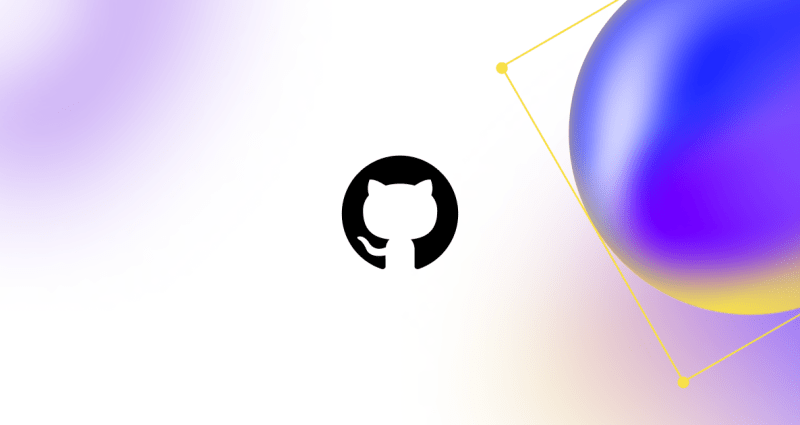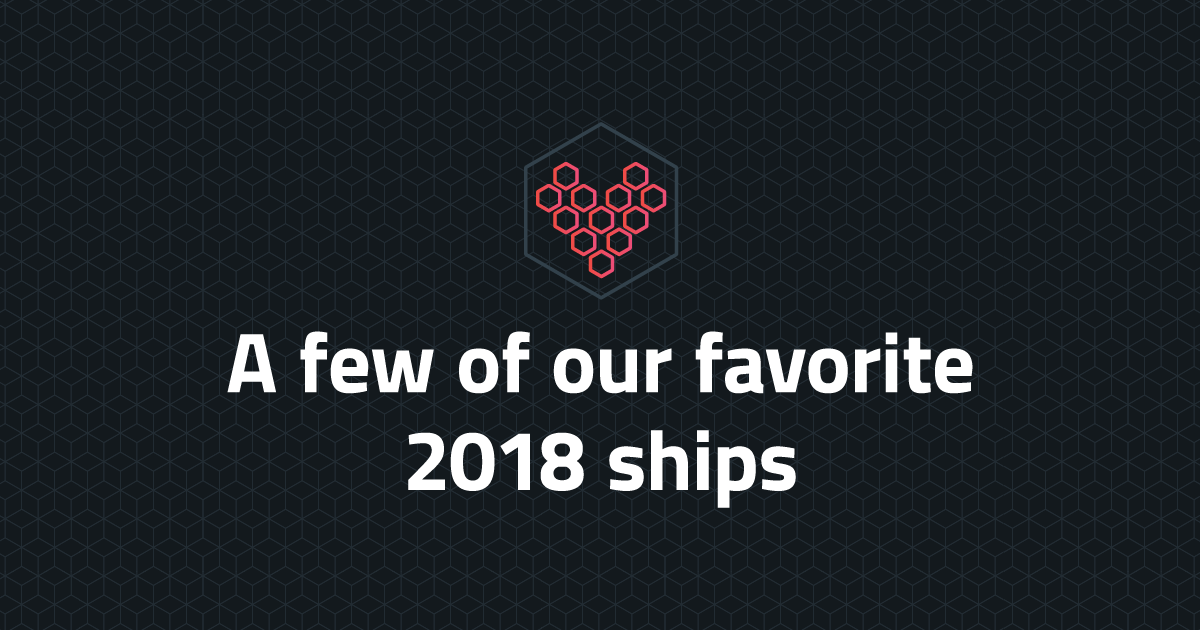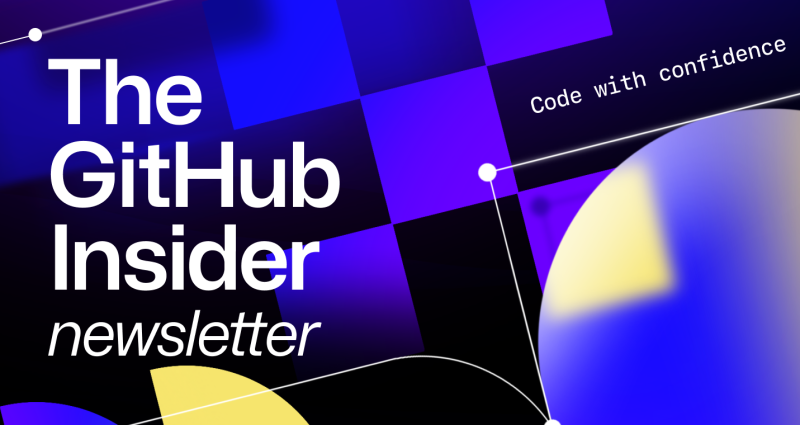Sometimes the smallest ships have the biggest impact. With 2018 coming to a close, we’re providing a round-up of what we shipped and what you may have missed, both big and small. We didn’t include every launch of the year (that would make for a very long read), but we did recap this year’s most loved ships.
Collaboration
The developer community is at the heart of GitHub. It’s where new developers get started, where experienced developers expand their knowledge, and where all developers work together. As the number of software developers worldwide continues to increase, the opportunities for collaboration increase as well. We strive to build experiences that make it as easy and intuitive as possible for all developers to do their best work. Here are some ships that make collaboration on GitHub even better:
-
Suggested changes: Quickly make and incorporate suggestions, like fixing typos or changing code, during the pull request review process.
-
Watch releases: Limit repository notifications exclusively to releases. Receive notifications when new releases are published in a repository without receiving notifications about other updates and conversations.
-
Move issues from one repo to another: Repository admins can move issues across repositories and place them where they belong.
-
Related issues: When you create a new issue, you’ll see a list of all related issues in your repository, so you can avoid opening a duplicate issue.
-
Commit co-authors: See who has contributed to every commit, regardless of how many contributors there are. Every author gets attribution in the pull request and in their contribution graph.
-
Hovercards: Hover over a contributor’s avatar to get an overview of their profile, what teams they belong to in your organization, if they are a code owner, if they’re making their very first pull request, and more.
-
New tools for open source maintainers: We released a few new tools in 2018 to make the lives of open source maintainers a little easier.
-
Saved replies keyboard shortcuts: It’s now even easier to use saved replies with keyboard shortcuts.
-
Label improvements: Now you can add emojis when words just aren’t enough, add descriptions for more context, search through your labels, and preview how your label will look while editing.
-
Profile activity overview: The new activity feed allows you to easily show off contributions you make. In addition to filtering your contributions by calendar year, you can now filter by organization and see where you contributed over your time on GitHub.
-
Save a notification for later: Bookmark any notification to move it into a prioritized list.
-
Issue and pull request templates: Issue templates better support automation and standardization. Automate assignees, labels, and even suggest issue titles. You can also add more than one issue and pull request template to get the right information from the start.
-
Improvements to projects: Projects got a lot better in 2018. From automation and UX improvements to enhanced permissions capabilities, projects are better than ever. Updates include:
Business
This year, there are new ways for businesses to stay secure, keep developers learning, and increase collaboration across their organizations.
-
Learning Lab: Learning Lab is an interactive, bot-driven learning experience for developers learning Git, GitHub, and software development skills and workflows—now customizable to specific workflows and scalable across organizations. With recent updates, organizations can create custom courses specific to their own workflows, policies, and growth paths, so developers can continue to level up their skills on the GitHub Platform.
-
GitHub Enterprise 2.12-2.15: GitHub Enterprise saw three major releases this year, with our latest 2.15 version that was released at GitHub Universe. The start of the show for 2.15’s release was GitHub Connect, meant to unify the developer experience across different organizations and deployment types.
-
GitHub Connect: GitHub Connect breaks down organizational barriers, unifies the experience across deployment types, and brings the power of the world’s largest open source community to teams at work. With GitHub Connect, companies can enjoy the scalability and ease-of-use of our cloud offering with the control of on-premises.
Developers should be able to choose the tools that are right for them, and it’s our job to make this as easy as possible by keeping GitHub’s platform and ecosystem open. In 2018 we doubled down on this commitment by releasing new integrations, APIs, and improved versions of well-loved platform products. Here’s our top platform ships of the year:
-
GitHub Actions: Build, connect, execute, and share code to customize your software development workflow with GitHub Actions. Easily package, release, update, monitor, and deploy your project, in any language—on GitHub or any external system—without having to run code yourself.
-
Google Cloud Build: Create fast, consistent, reliable builds across all languages. Easily set up CI through Cloud Build and automate builds and tests as part of your GitHub workflow.
-
Microsoft Azure Pipelines: Configure a CI/CD pipeline for any Azure application using your preferred language and framework as part of your GitHub workflow in a few simple steps.
-
Better JIRA integration: The improved integration allows software teams to connect their code on GitHub.com to their projects on JIRA Software Cloud. The new app updates JIRA with data from GitHub, providing your team with visibility into the status of your work.
-
Slack app for GitHub: The updated slack app brings GitHub activity right into your channels—keeping your teams up-to-date and productive. Along with the new app, we released some improvements, such as slash commands and private link previews.
-
GitHub extension for Visual Studio: Available for both GitHub.com and GitHub Enterprise, you can fork and customize GitHub for Visual Studio Code until it’s everything you want it to be.
-
GitHub for Unity: The new Unity package provides Unity game developers with the benefits of source control and GitHub without having to switch to the command line.
-
Checks API: Instead of pass/fail build statuses, your integrations can now report richer results, annotate code with detailed information, and kick off reruns—all within the GitHub user interface.
-
GitHub Experiments: We launched Experiments—a collection of demonstrations highlighting our most exciting research projects and ideas.
-
GitHub Desktop 1.1-1.5 releases: With five releases in 2018, GitHub Desktop is improving fast. With this year’s improvements you can compare branches, get notified when the default branch has updates to pull into your branch, compare conflicts before merging, and initiate a merge in the branch dropdown. Watch for our 1.6 release in early 2019.
Security
The security challenges that underpin software today are community problems. Developers and organizations have to protect their projects and businesses while staying vigilant and current on new security threats. Here are some of the notable 2018 ships that will help keep your code safe.
-
New improvements and best practices for account security and recoverability: In July we released new improvements meant to keep software development happening on GitHub safer.
-
Security vulnerability alerts available for Python, Java and .NET: Our security vulnerability alerts now support Java and .NET (in addition to existing support for JavaScript, Ruby, and Python). With security vulnerability alerts, organization owners and repository admins receive a notification when a known vulnerability enters a codebase.
-
Token scanning: Ensure your tokens and keys are never accidentally committed and exposed in a public repository. We scan public repositories to search for known token formats. If we find a token, we alert the provider who will validate it and contact the account owner to issue a new token.
-
Security Advisory API: To power GitHub security features, we aggregate and validate security feeds and monitor dependency upgrades across millions of projects. With the new API, this data is at your fingertips and ready to be integrated into the tools and services you already use.
Learning
Our goal is to lower the barrier to entry for anyone who wants to learn to code. GitHub Education had a big 2018 with product and program improvements to make it easier for student developers to get the real-world experience they need to build great software—and lead the next generation of software developers.
-
Classroom Assistant: We launched Classroom Assistant to allow educators to easily download all the repositories in their course. It’s a cross-platform desktop application, available for Windows, Mac, and Linux.
-
GitHub Education: GitHub Education helps students, teachers, and schools access the tools and events they need to shape the next generation of software development.
-
Student Developer Pack: The Student Developer Pack provides students with access to the best real-world tools so they can learn to code by doing. Unlike other free student tools in the industry, GitHub does not require a school email address to get the Student Developer Pack, which lowers the barrier to entry for millions of new developers worldwide. In 2018 we made the pack even better with the addition of Algolia, Heroku, GitKraken Glo, and JetBrains.
In 2019 we’re going to keep listening and keep shipping. We’re going to continue to build great products while maintaining our commitment to supporting developers in their choice of any language, license, tool, platform, or cloud. Thank you to all 31 million of you—we can’t wait to see what you build next.



